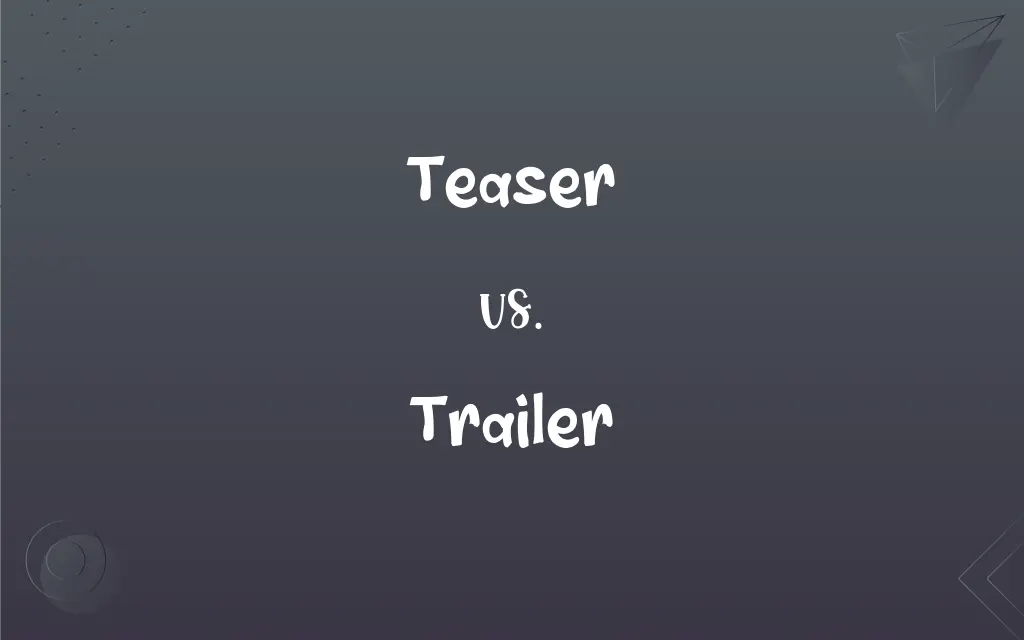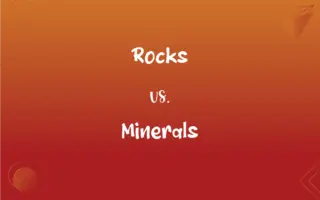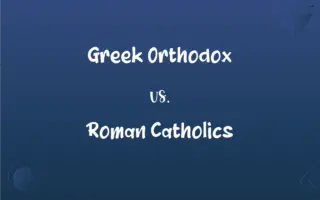Teaser vs. Trailer: What's the Difference?
Edited by Janet White || By Harlon Moss || Updated on October 19, 2023
A teaser is a short promotional clip hinting at content, while a trailer is a longer preview showcasing highlights.

Key Differences
A teaser, as the name implies, teases the audience by providing a glimpse or hint of the content without revealing too much. Trailers, on the other hand, are detailed previews that provide a broader overview of the content, highlighting key moments, characters, and plot elements.
Teasers are often mysterious, leaving viewers with questions and a heightened sense of curiosity. Trailers, meanwhile, are more informative, aiming to convey the main theme or storyline, and often include more substantial scenes from the content.
In terms of duration, teasers are generally shorter than trailers. A teaser might last anywhere from a few seconds to a minute, keeping the content largely under wraps. Conversely, trailers typically span between one to three minutes, delving deeper into the content's essence and scope.
When it comes to release timing, teasers often precede trailers. A teaser might be released to generate initial buzz and interest. Once the audience's appetite is whetted, a trailer follows, offering a more comprehensive look into the content.
While both teasers and trailers serve the promotional purpose, their approach varies. Teasers ignite curiosity through ambiguity, while trailers provide a clearer picture, helping the audience decide if the content aligns with their interests.
ADVERTISEMENT
Comparison Chart
Purpose
Ignite curiosity with minimal content.
Offer a comprehensive preview of the content.
Duration
Short (a few seconds to a minute).
Longer (typically one to three minutes).
Content
Ambiguous, often leaving viewers with questions.
Informative, showcasing key scenes and storyline.
Release Timing
Usually precedes trailers.
Follows teasers for a detailed look.
Emotion Evoked
Curiosity due to limited information.
Excitement and clarity about the content's theme.
ADVERTISEMENT
Teaser and Trailer Definitions
Teaser
A puzzling question or problem meant to challenge.
The math teaser stumped everyone in the class.
Trailer
A wheeled vehicle without its own means of propulsion.
He hitched the trailer to his truck for the camping trip.
Teaser
A brief promotional piece that hints at upcoming content.
The movie's teaser left fans eagerly waiting for more.
Trailer
A preview of a film or TV show highlighting key moments.
The movie trailer showcased the best action scenes.
Teaser
An advertisement designed to pique interest.
The product's teaser garnered significant attention online.
Trailer
A person or thing that trails.
The detective was a silent trailer, following the suspect.
Teaser
A device for testing or teasing.
She used a teaser to fluff up the pillow.
Trailer
A final segment in a broadcast or performance.
The news included a trailer about the upcoming weather.
Teaser
A short segment introduced before the main content.
The show started with a teaser to captivate viewers.
Trailer
A flat surface dragged behind an aircraft for target practice.
The military plane released a trailer for the missile exercise.
Teaser
One that teases, as a device for teasing wool.
Trailer
A large transport vehicle designed to be hauled by a truck or tractor.
Teaser
One who engages in teasing; a tease.
Trailer
A furnished vehicle drawn by a truck or automobile and used when parked as a dwelling or office.
FAQs
What is a teaser?
A teaser is a brief promotional clip hinting at upcoming content without revealing too much.
How long is a typical teaser?
Teasers are usually short, ranging from a few seconds to about a minute.
Are teasers and trailers the same?
No, while both are promotional, teasers are shorter and less revealing than trailers.
What is a trailer?
A trailer is a longer preview of content, showcasing key scenes and story elements.
Can a trailer also refer to a vehicle?
Yes, a trailer can mean a wheeled vehicle towed by another vehicle.
What does "trailing" mean in relation to a trailer?
"Trailing" refers to the act of following, and in some contexts, a trailer can mean someone who follows.
Are trailers only for movies?
No, trailers can be for movies, TV shows, video games, and other forms of entertainment.
Why are they called "trailers" if they come before a movie?
Historically, trailers were shown at the end of films, "trailing" the main feature, but the practice changed over time.
Can a teaser be a question or puzzle?
Yes, in some contexts, a teaser refers to a challenging question or puzzle.
Are trailers released before or after teasers?
Trailers usually follow teasers, offering a more detailed look into the content.
Can the term "teaser" also refer to a person?
Rarely, but in some contexts, "teaser" might mean someone who teases or makes fun.
How are trailers and teasers distributed?
Both are often released online, in theaters, on TV, and through other media outlets.
Can a teaser be longer than a trailer?
While unusual, it's possible, especially if the "trailer" is a short special clip.
Why are teasers used?
Teasers are used to ignite curiosity and generate initial buzz for content.
How long is a typical trailer?
Trailers typically last between one to three minutes.
What's the main goal of a movie trailer?
A movie trailer aims to generate interest and inform viewers about the film's theme and story.
Do teasers always come before trailers?
While often the case, it's not a strict rule; teasers can sometimes follow trailers.
Which reveals more about content, a teaser or a trailer?
A trailer reveals more, providing a comprehensive preview of the content.
Why might producers release a teaser instead of a full trailer?
A teaser can build anticipation and curiosity without giving away too much too soon.
Is a teaser always promotional?
Mostly, but the term can also refer to challenging questions or devices in other contexts.
About Author
Written by
Harlon MossHarlon is a seasoned quality moderator and accomplished content writer for Difference Wiki. An alumnus of the prestigious University of California, he earned his degree in Computer Science. Leveraging his academic background, Harlon brings a meticulous and informed perspective to his work, ensuring content accuracy and excellence.
Edited by
Janet WhiteJanet White has been an esteemed writer and blogger for Difference Wiki. Holding a Master's degree in Science and Medical Journalism from the prestigious Boston University, she has consistently demonstrated her expertise and passion for her field. When she's not immersed in her work, Janet relishes her time exercising, delving into a good book, and cherishing moments with friends and family.







































































